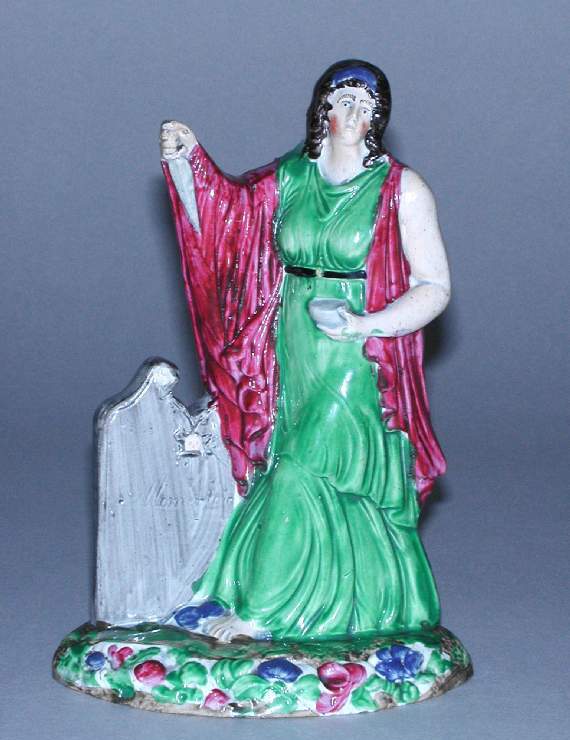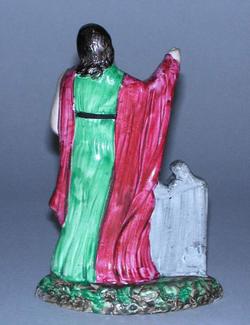Current Location: In storage
Titles
Tragedy
Maker(s)
Production:
Unidentified factory
Entities
Categories
Description
Lead-glazed earthenware figure representing Tragedy painted in polychrome enamels
Earthenware, press-moulded, with slightly blue-tinted lead-glaze (pearl or china glaze), painted in blue, two shades of green, pale flesh pink, dark puce, grey and black enamels. A woman representing Tragedy, standing on an oval base beside a tombstone with a skull in relief. She holds a dagger in her right hand and a cup in her left. She wears a long, flowing, sleeveless, green gown and a dark puce cloak draped over her right shoulder. The tombstone is grey and inscribed ‘Momento …ori’ [for ‘memento mori’]. The base is a pointed oval mound, moulded in relief with flowers and painted in green, blue and red. The back of the figure is flattened, but fully detailed and painted. The underside is recessed and glazed, with a central ventilation hole.
Notes
History note: An unidentified owner in Wisbech by whom sold to Mr Wordinham of Cambridge; bought with a pair (C.936A-1928) from Mr. Wordingham on 8 August 1925, for £4, by Dr J.W.L. Glaisher, FRS, Trinity College, Cambridge.
Legal notes
Dr J.W.L.Glaisher Bequest
Measurements and weight
Height: 14.6 cm
Width: 10.4 cm
Acquisition and important dates
Method of acquisition: Bequeathed
(1928-12-07)
by
Glaisher, J. W. L., Dr
Dating
19th Century, Early
Circa
1810
CE
-
Circa
1820
CE
Note
This is one of a pair of female figures representing Comedy and Tragedy, personifications which date from ancient Greece. The Fitzwilliam collection holds three such English earthenware figures, a pair (C.936A-1928 and C.936B-1928) and Tragedy (C.937-1928). Similarities in moulding and colours suggest that these may have come from the same maker.
Pearlware figures decorated with enamels were in production by 1780, though the bright coloured enamels on these figures indicates an early 19th Century date. They were generally made at smaller potteries and are rarely marked. A cheaper alternative to porcelain figures, they drew on a variety of sources, including sculpture and porcelain figures. Classical, biblical, mythological and literary subjects were popular, as were animals and representations of rural life, seasons and trades. Here the bodies are simple 3-part moulds, with a few hand-modelled parts applied.
School or Style
Neoclassical
People, subjects and objects depicted
Components of the work
Decoration
composed of
enamels
( blue, two shades of green, pale flesh pink, dark puce, grey and black)
lead-glaze
Parts
Materials used in production
Earthenware
Techniques used in production
Moulding
: Earthenware, press-moulded with applied modelled parts, lead glazed and painted with enamels.
Inscription or legends present
- Text: Momento ori
- Location: On tombstone
- Method of creation: Incised
- Type: Inscription
Inscription present: rectangular white paper stick on label
- Text: 4673b Staffordshire figure of standing woman holding a dagger in his hand. b. in Cambridge. Aug 9 1925, one of a pair.\par\cf0\f1\fs18\par}
- Location: Underside of base
- Method of creation: Handwritten in black ink
- Type: Label
References and bibliographic entries
Identification numbers
Accession number: C.936B-1928
Primary reference Number: 76410
Old object number: 4573
Stable URI
Audit data
Created: Saturday 6 August 2011
Updated: Monday 29 April 2024
Last processed: Tuesday 15 July 2025
Associated departments & institutions
Owner or interested party:
The Fitzwilliam Museum
Associated department:
Applied Arts





